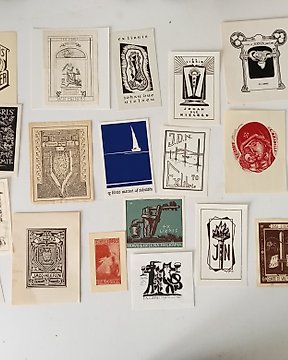Great Seller! Accurate item description! Packaging could be better, especially for these expensive objects.
Voir la traductionOscar Wilde - The Ballad of Reading Gaol - 1899
Nº 85766047



"The Ballad of Reading Gaol" by Oscar Wilde - Leonard Smithers, London - 1899 edition - 18cmx15cm - condition: good, original binding, some rubbing to boards, name to ffep, seventh edition, minor foxing
The Ballad of Reading Gaol is a poem by Oscar Wilde, written in exile in Berneval-le-Grand and Naples, after his release from Reading Gaol (/rɛ.dɪŋ.dʒeɪl/) on 19 May 1897. Wilde had been incarcerated in Reading after being convicted of gross indecency with other men in 1895 and sentenced to two years' hard labour in prison.
During his imprisonment, on Tuesday, 7 July 1896, a hanging took place. Charles Thomas Wooldridge had been a trooper in the Royal Horse Guards. He was convicted of cutting the throat of his wife, Laura Ellen,[1] earlier that year at Clewer, near Windsor. He was aged 30 when executed.[2][3]
Wilde wrote the poem in 1897, beginning it in Berneval-le-Grand and completing it in Naples.[4] The poem narrates the execution of Wooldridge; it moves from an objective story-telling to symbolic identification with the prisoners as a whole.[5] No attempt is made to assess the justice of the laws which convicted them, but rather the poem highlights the brutalisation of the punishment that all convicts share. Wilde juxtaposes the executed man and himself with the line "Yet each man kills the thing he loves".[6] Wilde too was separated from his wife and sons. He adopted the proletarian ballad form, and suggested it be published in Reynold's Magazine, "because it circulates widely among the criminal classes – to which I now belong – for once I will be read by my peers – a new experience for me".[7]
The finished poem was published by Leonard Smithers on 13 February 1898[8] under the name "C.3.3.", which stood for cell block C, landing 3, cell 3. This ensured that Wilde's name – by then notorious – did not appear on the poem's front cover. It was not commonly known, until the 7th printing in June 1899, that C.3.3. was actually Wilde. The first edition, of 800 copies, sold out within a week, and Smithers announced that a second edition would be ready within another week; that was printed on 24 February, in 1,000 copies, which also sold well. A third edition, of 99 numbered copies "signed by the author", was printed on 4 March, on the same day a fourth edition of 1,200 ordinary copies was printed. A fifth edition of 1,000 copies was printed on 17 March, and a sixth edition was printed in 1,000 copies on 21 May 1898. So far the book's title page had identified the author only as C.3.3., although many reviewers, and of course those who bought the numbered and autographed third edition copies, knew that Wilde was the author, but the seventh edition, printed on 23 June 1899, actually revealed the author's identity, putting the name Oscar Wilde, in square brackets, below the C.3.3.[9][10] The poem brought him a small income for the rest of his life.
The poem consists of 109 stanzas of 6 lines, of 8-6-8-6-8-6 syllables, and rhyming ABCBDB. Some stanzas incorporate rhymes within some or all of the 8-syllable lines. The whole poem is grouped into 6 untitled sections of 16, 13, 37, 23, 17 and 3 stanzas. A version with only 63 of the stanzas, divided into 4 sections of 15, 7, 22 and 19 stanzas, and allegedly based on the original draft, was included in the posthumous editions of Wilde's poetry edited by Robert Ross, "for the benefit of reciters and their audiences who have found the entire poem too long for declamation"
"The Ballad of Reading Gaol" by Oscar Wilde - Leonard Smithers, London - 1899 edition - 18cmx15cm - condition: good, original binding, some rubbing to boards, name to ffep, seventh edition, minor foxing
The Ballad of Reading Gaol is a poem by Oscar Wilde, written in exile in Berneval-le-Grand and Naples, after his release from Reading Gaol (/rɛ.dɪŋ.dʒeɪl/) on 19 May 1897. Wilde had been incarcerated in Reading after being convicted of gross indecency with other men in 1895 and sentenced to two years' hard labour in prison.
During his imprisonment, on Tuesday, 7 July 1896, a hanging took place. Charles Thomas Wooldridge had been a trooper in the Royal Horse Guards. He was convicted of cutting the throat of his wife, Laura Ellen,[1] earlier that year at Clewer, near Windsor. He was aged 30 when executed.[2][3]
Wilde wrote the poem in 1897, beginning it in Berneval-le-Grand and completing it in Naples.[4] The poem narrates the execution of Wooldridge; it moves from an objective story-telling to symbolic identification with the prisoners as a whole.[5] No attempt is made to assess the justice of the laws which convicted them, but rather the poem highlights the brutalisation of the punishment that all convicts share. Wilde juxtaposes the executed man and himself with the line "Yet each man kills the thing he loves".[6] Wilde too was separated from his wife and sons. He adopted the proletarian ballad form, and suggested it be published in Reynold's Magazine, "because it circulates widely among the criminal classes – to which I now belong – for once I will be read by my peers – a new experience for me".[7]
The finished poem was published by Leonard Smithers on 13 February 1898[8] under the name "C.3.3.", which stood for cell block C, landing 3, cell 3. This ensured that Wilde's name – by then notorious – did not appear on the poem's front cover. It was not commonly known, until the 7th printing in June 1899, that C.3.3. was actually Wilde. The first edition, of 800 copies, sold out within a week, and Smithers announced that a second edition would be ready within another week; that was printed on 24 February, in 1,000 copies, which also sold well. A third edition, of 99 numbered copies "signed by the author", was printed on 4 March, on the same day a fourth edition of 1,200 ordinary copies was printed. A fifth edition of 1,000 copies was printed on 17 March, and a sixth edition was printed in 1,000 copies on 21 May 1898. So far the book's title page had identified the author only as C.3.3., although many reviewers, and of course those who bought the numbered and autographed third edition copies, knew that Wilde was the author, but the seventh edition, printed on 23 June 1899, actually revealed the author's identity, putting the name Oscar Wilde, in square brackets, below the C.3.3.[9][10] The poem brought him a small income for the rest of his life.
The poem consists of 109 stanzas of 6 lines, of 8-6-8-6-8-6 syllables, and rhyming ABCBDB. Some stanzas incorporate rhymes within some or all of the 8-syllable lines. The whole poem is grouped into 6 untitled sections of 16, 13, 37, 23, 17 and 3 stanzas. A version with only 63 of the stanzas, divided into 4 sections of 15, 7, 22 and 19 stanzas, and allegedly based on the original draft, was included in the posthumous editions of Wilde's poetry edited by Robert Ross, "for the benefit of reciters and their audiences who have found the entire poem too long for declamation"
- 601
- 37
- 18
Uitstekend over de gehele lijn: aanbevolen verkoper!
Voir la traductionVery beautiful books.
Voir la traductionBoeken in goede orde ontvangen, dank. Er waren wat problemen met de verzending en dan blijkt dat het contact met de verkoper nogal moeizaam verloopt.
Voir la traductionAll good.
Voir la traductionprima, alles precies zoals verwacht. top.
Voir la traductionSpedizione a dar poco lenta, penso che avrebbe fatto più presto a viaggiare con una carrozza a cavalli. Spese di spedizione eccessive, pagati separatamente due oggetti arrivati nello stesso pacco
Voir la traductionSpedizione a dar poco lenta, penso che avrebbe fatto più presto a viaggiare con una carrozza a cavalli. Spese di spedizione eccessive, pagati separatamente due oggetti arrivati nello stesso pacco
Voir la traductiontutto ok
Voir la traductionTrès bien merci
Voir la traductionBoek volgens beschrijving, levering liet iets op zich wachten, was iets verkeerd gegaan bij de post.
Voir la traductionBoekje is goed
Voir la traductionBeste Mayflower, ik ben zeer tevreden over het Caldecott-album als over de wijze van fairtrade
Voir la traductionexcelent pack of books and good delivery!
Voir la traductionBijzonder blij, bijzonder mooi boekwerk. Stevig verpakt en snel geleverd. Thanks !
Voir la traductionSlechts 1 boek ontvangen. Deze 3 boeken nooit ontvangen! Verkoper antwoord niet op berichten. Na eerdere negatieve ervaringen met deze verkoper is mijn conclusie koop niet bij deze verkoper!
Voir la traductionIk ben deze week weggeweest. Ik heb u net een bericht gestuurd dat een onderzoek met postnl opgestart zal worden voor dit pakket; en u kan vervangende boeken krijgen of een refund.
Boek is in orde maar ruim 2 weken op verzending moeten wachten.
Voir la traductionEverything fine – the envelope was a bit torn, but the bubble wrap protected the book well. Thanks.
Voir la traductionEstá en buenas condiciones a. pesar de haber sido usado un largo tiempo . Gracias
Voir la traductionTodo correcto. Muchas gracias
Voir la traductionPoor packaging as always. A padded bag is not suitable for heavy books posted abroad. Book sustained damage to corners,
Voir la traductionNice book thanks!
Voir la traductionBeautiful books as described. Perfect delivery. Many thanks!
Voir la traductionsuper tevreden. Boek was zeer goed ingepakt. Bedankt.
Voir la traductionFast delivery and well-packaged (luckily, because the courier just slammed it through the mailslot). Always happy buying from this seller!
Voir la traduction- 601
- 37
- 18
Great Seller! Accurate item description! Packaging could be better, especially for these expensive objects.
Voir la traductionMentions légales
Ce Lot est mis en vente par un particulier. En conséquence, vous ne disposez pas du droit de rétractation.
De la même manière, parce que ce Lot est mis en vente par un particulier, il ne bénéficie pas de la garantie légale de conformité des biens mentionnée aux articles L.217-4 et suivants du code de la consommation ainsi que de la garantie des défauts de la chose vendue énoncée aux articles 1641 et suivants du code civil.
Vendre un objet est un acte juridique, qui crée des obligations à votre égard et peut éventuellement engager votre responsabilité civile. Afin d’en savoir plus sur vos obligations, nous vous recommandons de consulter le lien suivant.
Mentions légales
Ce Lot est mis en vente par un particulier. En conséquence, vous ne disposez pas du droit de rétractation.









